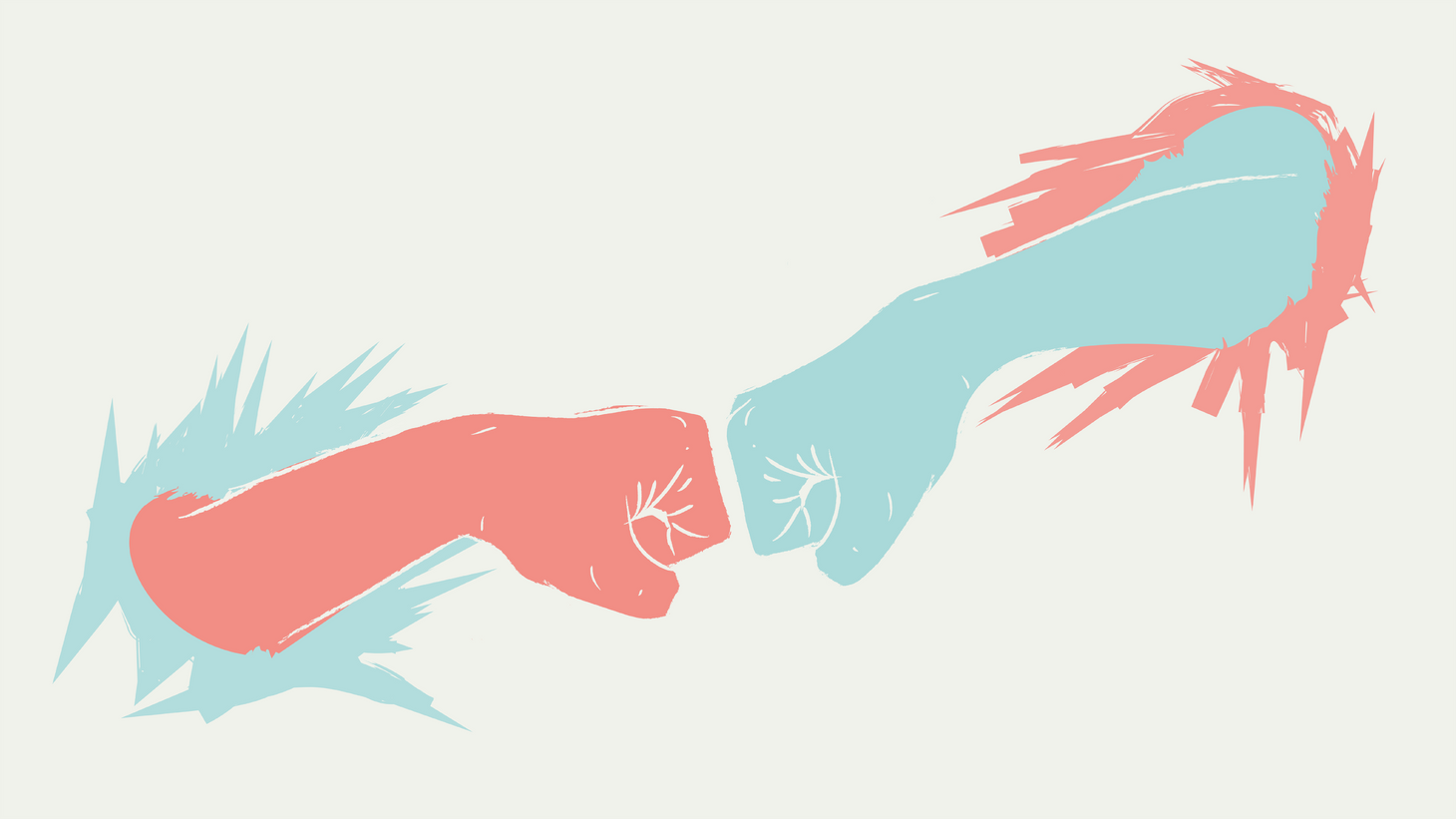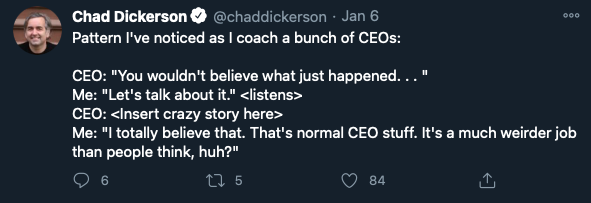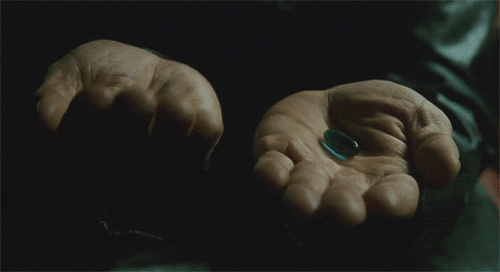How to overcome imposter syndrome and kick more ass
Practical steps for moving through the fear that you are not enough

A fateful walk
I was trying to hide the tears welling up in my eyes. It had been a tough day in the midst of a tough week, month, and year.
The Series B we had been preparing for the last year was not coming together the way we hoped.
We were living on debt.
Our revenue, which had been growing steadily for over a year, had suddenly cratered. Our best acquisition channel imploded when our domain got dinged and our email deliverability rates went through the floor.
Even now, sitting in a cabin in the California mountains years after the experience, I can feel my shoulders tense up and my mouth go dry remembering those days.
I grabbed my co-founder, Todd, for a walk. I needed to get some of the angst out.
"I don't think I'm the right person to do this," I said as the tears welled.
"To do what?" he asked.
"To figure this out. To lead this company. I feel like I just keep failing. I feel like we are going to fail and it is going to be all my fault," I said.
Todd, ever thoughtful, gave me a moment. He let my words hang in the silence inviting me to listen myself to what I was saying.
"Is there someone better available?" he asked.
The way the word 'available' came out made me smile through my anxiety.
"I don't know," I admitted, "Probably not."
If Todd had a primary area of brilliance as a co-founder, it was cutting through my brain fog with a simple question, statement, or facial expression. And he did so right in that moment.
"I don't know if there is anyone better out there to be CEO of this company right now. And I don't think you know either. I am not sure it matters. Right now, you're the CEO. And we need you."
Todd has since gone on to be a founder coach, and if his talent coaching of me that day is any indication, he's a damn good one.
With those gentle but firm words, Todd was inviting me to take my seat as CEO. To acknowledge but step through the imposter syndrome, the fear that I was simply faking it and had no idea what I was doing that was haunting my days in that difficult year.
That day marked a turning point for me. The change was not immediate; it would take another year before I found myself fully able to own the truth that I was a good CEO. To own that, while flawed and prone to error, I was likely the best possible CEO for our company at that time.
As I look back at my 7+ years as CEO of my last company, one of my greatest regrets is not stepping into my strength and ability as CEO as quickly as I might have. Not because it would have spared myself pain and anxiety (although there is that benefit as well) but because I believe I would have been a better, more present, more caring, and more successful CEO had I allowed myself to make the shift earlier.
If any of that experience resonates with you, I would invite you along here to explore how on your own journey as a leader you might step into your own strengths more quickly than I did. You, my friend, do not have to wait.
The nearly universal question
It might be helpful for me to invite you into the coach's experience for a moment.
One of my favorite parts of coaching leaders is that I get to see behind the curtain. Everybody's 'outsides,' their 'best foot forward,' is shared on TechCrunch. I get to see and hear about the parts of the experience no one wants to talk about. And that is such a gift.
From the vantage point of a coach, I have been fortunate to observe that fears of enough-ness are nearly universal.
Nearly all of us type-A, driven, founder/leader/achiever types who step into these big roles wonder if we actually have what it takes. And nearly all of us face a significant fear that we might not.
Imposter syndrome.
They call it a syndrome for a reason.
If it just happened once in awhile they would call it an incident.
But it's not. It's a syndrome. And it is nearly universal.
The particular challenge of the founder / CEO role
While imposter syndrome is common among leaders, athletes, academics, and high-achievers of all stripes, there are some elements of the founder / CEO role that I believe make the challenge of owning one's enough-ness in these roles particularly challenging.
First, if you are a founder / CEO, there is a high likelihood you have never done this before. By the numbers, most founder / CEO's are in the job for the first time. So it's new.
And this is not your grand-daddy's CEO role. You did not start as a clerk on the sales floor and work your way up the corporate ladder learning the biz as you went. This company, this role, maybe even this market did not fucking exist a fear years ago.
And yet, we tell ourselves, we must be perfect. We must be masters of the role, of the experience, of the business, of our market.
It does not do us any favors, as noted above, that we spend our time comparing our insides to everybody else's outsides. We read about the achievements of others in the press and in their tweets. Very few founders and leaders spend time tweeting about their fears and failures. Yet most of us spend the majority of our time wrestling more with our fears and failures than basking in our successes.
So we peruse Twitter and Techcrunch reading about the successes and 'a-ha' moments of others while, simultaneously, very much aware of our own wrestling-match with self-doubt.
The founder / CEO role is practically custom-made to induce imposter syndrome.
We are always trying to convince someone that we are better, more self-assured, and more confident about future than we feel on the inside.
Whether raising capital, hiring senior employees, or convincing prospective co-founders to join us in the crazy journey, it never feels like a good time to admit that we wake up at 3 am wracked with fear.
What is more, the role of CEO itself is constantly changing.
In my years as a founder / CEO, every time I felt like I gained any sense of mastery over the role the job changed right under my feet. The number of employees changed, the company stage changed, the competitors changed, the capital markets shifted, the Chinese stock market imploded. It was like trying to play chess on three boards at once where the opponent and rules kept changing on each.
I, perhaps like you, love the deep gratification of mastering a job. Of feeling uniquely great at something. The founder/CEO role offers no such gratification.
I am convinced that even those we look up to and hold as masters of the craft never feel truly good at the role.
If you are lucky and work your ass off, there are breakthrough moments. There are big wins. You survive long enough to make a career at the craft. But those successes are short-lived and are not what defines most of the days on the job.
Most days are full of struggle.
I love this tweet from my good friend and fellow-coach Chad Dickerson:

If nobody ever gets to master the role, is it any wonder we all walk around feeling like we are faking our way through it?
The myth
One of the common causes of imposter syndrome I see as a coach is what I have come to call the 'mythical perfect CEO.'
I don't know where this dude came from, but he's everywhere.
Frequently, on coaching calls, a client will compare their approach to or feelings about a particularly challenge to the way 'a great CEO' would approach or feel about the challenge.
I have no fucking idea who this mythical CEO is.
And so, I often ask.
"Who are you comparing yourself to? Who is this mythical, unicorn leader who is impervious to confusion or self doubt, who sees through complex challenges with mystical clarity and leaps over big emotions in a single bound?"
My question is typically met with a laugh and some kind of admission that yes, maybe, just maybe, they are comparing themselves to a leader who does not exist.
Let's dispel the myth.
Instead, let's consider the data.
The data tells us that founder-led companies succeed more frequently and create more shareholder value than non-founder-led companies.
Given that founders tend to be less experienced than hired-gun CEO's, what gives?
Why did Twitter, when faltering in growth and innovation, bring back Jack Dorsey? Surely Dick Costolo was up to the job of being a 'better,' 'more professional,' more experienced' CEO.
What caused Apple to woo back Steve Jobs after John Sculley, one of the most renowned in the world at the time, could not inspire Apple to innovate its way out of the challenges at hand?
In your own leadership role, might there by something needed that, like Dorsey and Jobs, you are best positioned to give?
What do you see if you imagine for the moment, just a moment, that perhaps you are the single best person in the world for the job at hand?
What if there is no getting it right?
I am not suggesting that every CEO is the right person for the job they are currently in. But, if founder/CEOs lead to better outcomes, and if 90%+ of founder/CEOs are walking around carrying the weight of imposter-syndrome, that adds up to a whole helluvalot of people who are precisely the best person for the job and yet doubting their own ability.
And that, my friends, sounds emotionally, psychology, and financially expensive.
What is at stake?
What then is the cost of not fully 'taking our seat' (as my own prior coach Jerry Colonna used to call it) as CEO's, of fully stepping into our strength and leaning into the job at hand?
For me, as a CEO, holding onto the belief that there was somebody better out there and that I was simply faking my way through the role prevented me from fully stepping into the learning at hand.
I could not fully trust my intuition or my judgments because I viewed myself a faulty instrument.
And like trying to measure the results of any experiment with faulty instruments, I found it difficult to trust the results at hand and make the requisite rapid decisions necessary to help the company internalize learnings, adjust, and move forward.
Imposter syndrome also kept me from owning and leveraging my strengths.
I was like Neo getting his ass-kicked in the Matrix.
I had superpowers and unique abilities, but I did not trust them because I had not fully exercised and tested them.
We all have superpowers of one kind or another. But we cannot learn about them if we spend all our time staring at our shortcomings trying to wish them away.

Rather than lean into my own intuition, I wasted a tremendous amount of time trying to 'learn' about how a better CEO would handle the questions at hand.
I read and took meetings incessantly.
Now, I am all for reading, learning, and seeking outside expertise where helpful. It is critical. A great founder or leader ought to first be a great student of the many crafts at hand. No question. But I took it too far. Rather than waking up to the realization that I and my team were uniquely informed on the challenges we faced and uniquely equipped to tackle them, I found myself always reaching outside the organization for help.
That wasted a lot of time. Startups cannot afford to waste time.
What do I have to give up to have what I want?
If there is so much to gain in fully taking our seat as CEOs, why do we hesitate?
As humans, we tend to repeat patterns or hold onto beliefs that serve us in some way. If what we desire is change, it can be helpful to begin by acknowledging, even honoring, the way the old patterns or beliefs have been helpful to us.
For me, as I look back on what I was trying to protect by holding onto my imposter syndrome, I see that my refusal to belief that I was the right person for the job eased my fear of failure.
If I was not the right person for the job, it mattered less if I failed. At least I think that is how my subconscious held the belief. Failure was scary to me.
Growing up, I felt out of place in my family and in my grade school. Good grades, which later morphed into perfectionism, became a way for me to gain positive attention and a sense of belonging.
A risk of failure, or mediocrity, thus threatened my very sense of belonging in the world.
Running a startup while holding a belief that one's belonging is tied to 'perfect' is a tough recipe.
Most startups fail. Those that succeed fail thousands of times along the way.
My imposter syndrome enabled me to undertake a task, starting a company, that had a huge chance of failure. And it allowed me to walk through those office doors each day.
Eventually, however, the cost of not taking my seat as CEO became too high.
What I have observed in my own life, and what I have come to witness in the lives of many coaching clients, is that sustained change is most easily possible when we have come face to face with the awareness that the cost of not changing outweighs our fear of letting go of our old way of being.
And therein lies the invitation for each of us.
The awaiting invitation
The world needs confident, heard-led, present leaders now more than ever.
Your team probably does too.
If your experience is anything like mine, you are the only person standing in the way of you becoming the leader your team and the world need.
So how do we go from here to there?
Let's talk tactics.
Tactics for taking your seat as CEO (or leader)
Tactic 1: Honor and air the fear
I find in my life that my fears tend to have the most power over me before I have brought them out into the open, named, them, or examined them.
It is the looming anxiety in the back of my mind, or my felt but not discussed extreme emotional response to some news or event that feels most debilitating.
I love the story from the Tibetan tradition about the yogi Milarepa. I am neither Buddhist nor Tibetan, but the illustration is powerful.
One day Milarepa left his cave to gather firewood, and when he returned he found that his cave had been taken over by demons. There were demons everywhere! His first thought upon seeing them was, “I have got to get rid of them!” He lunges toward them, chasing after them, trying forcefully to get them out of his cave. But the demons are completely unfazed. In fact, the more he chases them, the more comfortable and settled-in they seem to be. Realizing that his efforts to run them out have failed miserably, Milarepa opts for a new approach and decides to teach them the dharma. If chasing them out won’t work, then maybe hearing the teachings will change their minds and get them to go. So he takes his seat and begins teaching about existence and nonexistence, compassion and kindness, the nature of impermanence. After a while he looks around and realizes all the demons are still there. They simply stare at him with their huge bulging eyes; not a single one is leaving.
At this point Milarepa lets out a deep breath of surrender, knowing now that these demons will not be manipulated into leaving and that maybe he has something to learn from them. He looks deeply into the eyes of each demon and bows, saying, “It looks like we’re going to be here together. I open myself to whatever you have to teach me.” In that moment all the demons but one disappear. One huge and especially fierce demon, with flaring nostrils and dripping fangs, is still there. So Milarepa lets go even further. Stepping over to the largest demon, he offers himself completely, holding nothing back. “Eat me if you wish.” He places his head in the demon’s mouth, and at that moment the largest demon bows low and dissolves into space.
I spent time this morning with a brave CEO who is preparing for what he thinks may be a difficult Series B fundraising round. I could tell in the early moments of the call that he was carrying quite a bit of anxiety and fear about the round.
As we unpacked his fear, I watched him put his head in the demon's mouth.
"What is the fear here?" I asked.
"What if I let everybody down. What if we cannot raise this round?" He asked.
I let the question hang in the space between us.
"What then," I asked.
"Well. We would have to raise a smaller round from our inside investors and wait on the Series B until next year," he reflected.
"How does it feel to say that?"
"It feels good." I could see his shoulders relax and his smile return. "It feels like we have options."
Sometimes simply describing the fear to a coach, therapist, co-founder, or friend is a huge help. As it was for me on that walk with Todd.
Journaling is another great outlet here.
I have written before about the 'stress board' that is a part of my own morning routine. I like to take a few moments in the morning to note any fears or anxieties I am carrying. It helps me ensure I am noting and inviting into the open anything I am carrying. (You can learn more about this morning practice here.)
If you are carrying unnamed fears, how might you invite them into the open? What would it be for you to stick your own head in the demon's mouth?
Tactic 2: Host a fire ceremony (yes that's right a ceremony)
Humans have leveraged ceremonies throughout most of our history to aid in the transition from one state of being to another. In our modern life, at least in the west, we have often forgotten the power of ceremonies.
I first learned about fire ceremonies from my own long-time coach and friend Jim Marsden. Having studies the practices of native culture, and the benefits of those practices, Jim is a frequent practitioner of fire ceremonies. And through his model they have become a favorite practice in my own life.
The mechanics are simple:
- Build a fire (could be a small one in your trash can or as simple as a single match-stick).
- Prepare something you would like to let go of (could be the actual item, something that symbolizes the item, or a pierce of paper with the thing written on it).
- Greet the fire as you like. I like to thank it for the the role of warmth its played in my life or such.
- Share a few words about what is coming to an end. You might share how the thing has been helpful to you and then share how you know that now is the time for this thing to come to an end.
- When you are ready, release the item to the fire.
A few clarifying comments may be helpful here. One is it is not helpful to release anything to the fire which you are not actually ready to let go of. Bring to the fire only what you are actually ready to release. The fire will symbolically and physically aid in the removal, but it is you who must release whatever you are giving up.
You can do this alone, and that can be wonderful. If you have a trusted friend or ally, however, a fire ceremony where each person present is invited to bring to the fire something she is ready to let go of can be a powerful shared experience.
Tactic 3: Embrace the superhero CEO as friend not foe
The third tactic to which we might turn involves leveraging the 'superhero CEO' I referenced above as an ally.
Consider the challenge or task at hand. Ask yourself, "What would she do." Give yourself some space to journal about or simply consider what comes up. It may be that you are able to quickly see how someone whom you imagine to be free from the hangups you find yourself in would handle the challenge at hand.
I love to leverage this tool in coaching sessions. I am continually amazed how quickly a client is often able to move from feeling completely stuck on how they might handle a situation to seeing with such clarity only a moment later how a 'great' CEO would act.
When I ask "what is preventing you from responding to the challenge the way you imagine a great CEO would" the answer is often "nothing." That's a big switch to flip.
What is actually happening here?
For me, what I can see happening is that I am giving myself permission to let go of my fears and simply step into and live out of my convictions. The 'superhero' I am imagining is actually a projection of my own strengths and thoughts reflecting off pool that is not muddied by my self-doubts. Carl Jung might call this tapping into strength that we had previously relinquished to our shadow (for more on this, check out my discussion with Doist founder Amir Salihefendic.
Well wishes along the journey
I hope some of these tactics might prove helpful as you play with them in your own life.
I know there are no quick fixes here, but the invitation to lean into the work of uncovering and embracing your own strengths is here for you. The seat is yours to take.
Your team, and the world around you, are ready for you to live and lead from a place that is fully alive, fully available, and fully you.
Welcome to one of the most critical turning points in your journey as a leader.
Sending love and well wishes from my little cabin to wherever you may be.
-Matt
Sanity Notes Newsletter
Join the newsletter to receive semi-weekly updates in your inbox.


